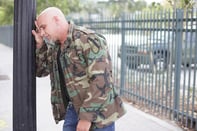Published on
Four Misconceptions Veterans Face in Higher Education

Veterans are a growing demographic in the higher education space. They currently make up approximately 4 percent of the total population of undergraduates in the United States, and that number is expected to continue rising given the scale-down of military operations abroad and domestically.[1], [2]
A unique segment of the non-traditional student population, veterans are immensely diverse with a wide range of goals, interests and characteristics. Unfortunately, there are a few misconceptions held by administrators, staff and faculty that negatively impact the experience of student veterans on campus. In this piece, I will address four of the most prominent.
1. Deficit Modeling
Deficit model: A lack of understanding of a group that leads to low expectations of that group by non-group members.
Deficit modeling is common among higher education staff and faculty members, who only inform themselves with popular stereotypes of veterans, such as we are poor academic performers, or that we can go on an angry rampage at any moment. There is an assumption that it’s better to work with veterans at an arm’s length, for fear of causing offence. Worse still, many staff and faculty members simply assume the majority of veterans on campus are affected by post-traumatic stress disorder, which impacts their approach to these students.
There are no grounds for these stereotypes, and we’re starting to see recognition of that among postsecondary leaders who work with veterans daily. At the recent NASPA Veterans Conference, many of my colleagues were similarly irritated by the prevalence of these assumptions across their own campuses.
While we’re starting to work to diminish this misconception, it has an impact on the way staff and faculty treat student veterans on their campus and, unfortunately, negatively impacts those students’ postsecondary experiences.
2. Academically Deficient
Similar to the issue with deficit modeling, staff and faculty tend to assume that veterans, who may have been out of school for an extended period of time, will be academically weak.
It’s certainly true that this is an issue for many non-traditional students, and among some veterans there is absolutely a need for remedial education. However, the academic skill range of the student veteran population is broad. There are many veterans who have sharper math and writing skills than their traditional-aged counterparts.
Overcoming this misconception is relatively simple; I would suggest staff and faculty ask veterans if they feel they need any “brush up” on academic skills upon their application and enrollment. It allows highly ready veterans to shine immediately without having to go through the unnecessary process of proving themselves upon entry to the institution.
3. Desperate for Community and Activities
There is a notion among higher education administrators that veterans are desperate for the company of other veterans at all times, that this company is central to their success. Moreover, administrators and staff also tend to associate campus involvement with future success, reacting to the non-empirically shown belief of scholars in the Vincent Tinto camp.
For non-traditional students and veterans, this kind of social integration is unnecessary for academic success. Many campuses have veteran centers but, according to the Student Veterans of America, veterans’ centers serve about 10 to 15 percent of that institution’s veteran population. Many veterans see their veteran status as a part of their past, not necessarily their present, and they’re looking at their educational experience as a new chapter in a life that leaves the military behind.
Furthermore, we need to get past the notion that involvement with campus activities is critical for student success. All non-traditional students—veterans, commuters, working adults—have a number of demands on their time and energy. They’re not necessarily interested in being a part of a campus club or student government. Administrators should understand and respect that.
4. Resistant to Teamwork
One thing that ties veterans together it’s their sense of teamwork, a habitus developed through intensive military training. However, many faculty members tend to view veterans as not being team players in school, preferring to work alone.
This is because, often, student veterans wind up in project and study groups with 18- to 22-year-old students who have vastly different priorities than the average adult student. While a non-traditional student often wants to get projects started immediately and finished well before the due date—often due to conflicting scheduling issues and other priorities—traditional-age students are more than comfortable procrastinating and finishing a project in a mad dash at the finish line.
These divergent priorities often mean that, in group project settings, veterans will take the lead and shoulder a great deal of the work in order to achieve a high grade. This is not an uncommon experience—an EvoLLLution article written by a student veteran chronicles this exact issue! These experiences lead veterans to dislike the notion of working in teams with traditional-age students, not because veterans are teamwork averse, but because we don’t want to pull more than our fair share of the load and we don’t necessarily want to be leading a team of 18 to 20 year olds who are skilled at procrastinating.
One solution for this would be for faculty to try to match veteran students with other non-traditional students when it comes time for group work. This will ensure they are paired with other students facing similar time and priority constraints, and will lead to a more positive academic experience.
– – – –
References
[1] Veterans Education and Transition Services, “Research Clearinghouse,” The University of Arizona. Accessed at http://vets.arizona.edu/clearinghouse/research.php
[2] Tanya Ang and Dani Molina, “From Access to Graduation: Supporting Post-9/11 Undergraduate Student Veterans,” Higher Education Today, November 10, 2014. Accessed at http://higheredtoday.org/2014/11/10/from-access-to-graduation-supporting-post-911-undergraduate-student-veterans/
Author Perspective: Association


